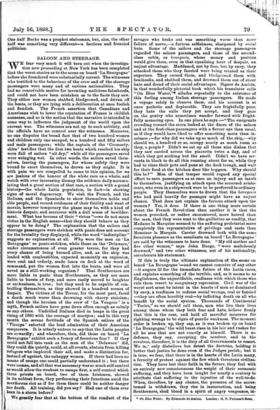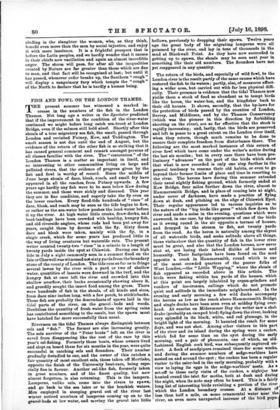SALOON AND STEERAGE.
WE fear very much it will turn out when the investiga- tion now proceeding at New York has been completed that the worst stories as to the scene on board 'La Bourgogne' before she foundered were substantially correct. The witnesses who testified to the behaviour of the crew and of the steerage passengers were many and of various nationalities. They had no conceivable motive for inventing malicious falsehoods, and could not have been mistaken as to the facts they saw. They either saw women stabbed, bludgeoned, and driven off the boats, or they are lying with a deliberation at once foolish and fiendish. The French assertion that Canadians and Americans wish to lower the reputation of France is childish nonsense, and so is the notion that the narrative is intended in some way to influence the judgment of the world upon the current war. The witnesses are not up to such subtlety, and the officials have no control over the witnesses. Moreover, no one disputes the broad fact that of two hundred women and children only one escaped, to a hundred and fifty sailors and male passengers ; while the captain of the ' Cromarty- shire ' testifies that the first two boats which reached his ship were full of sailors "all dry," while all the passengers saved were wringing wet. In other words, the sailors saved them- selves, leaving the passengers, for whose safety they were bound to exert themselves, to drown as they might. It is with pain we are compelled to come to this opinion, for we are jealous of the honour of the white race as a whole, and watch with ever increasing dismay the evidence daily accumu- lating that a great section of that race, a section with a grand history—the whole Latin population, in fact—is showing signs of moral degeneracy. We wish the French, and the Italians, and the Spaniards to show themselves noble and able people, and record evidences of their futility and want of morale, however temporary the phase may be, with a kind of historic despair, and moreover with a dull sense of bewilder- ment. What has become of their "virtue "—we do not mean virtue in the English sense—that they should behave as they appear to be doing P The explanation that the sailors and steerage passengers were stricken with panic does not account for the brutality they displayed, while the word "indiscipline" suggests no explanation at all. Why were the men on 'La Bourgogne' so panic-stricken, while those on the 'Delaware,' under circumstances of even greater terror, for they had every chance of being burned alive, and, as the ship was loaded with combustibles, expected momently an explosion, were cool and orderly, made lanes on deck at the word of command, put the women first into the boats, and were all saved as a still-working organism ? That Southerners are more liable to panic than Northerners, as they are more liable to bursts of fury, and more easily moved to laughter or enthusiasm, is true ; but they used to be capable of con- trolling themselves, as they showed in a hundred scenes of despair. The victims of the Terror, for the most part, faced a death much worse than drowning with cheery stoicism; and though the heroism of the crew of ' La Vengeur ' is a myth, French sailors have gone down often enough as calmly as any others. Undrilled Italians died in heaps in the great rising of 1860 with the courage of martyrs ; and in this very month the serene fortitude of the Spanish sailors of the ' Vizcaya' extorted the loud admiration of their American conquerers. It is utterly untrue to say that the Latin peoples are cowardly ; and wherefore, then, did those on board ' La Bourgogne' exhibit such a frenzy of ferocious fear ? If they could not fall into rank as the men of the ' Delaware' did, they could die quietly, could, at all events, abstain from killing refugees who implored their aid, and make a distinction for, instead of against, the unhappy women. If there had been no means of escape one could partially understand it ; but there were means, and all that was necessary was so much self-control as would allow the weakest to escape first, a self-control which three priests on board, two of them Irishmen, showed in its noblest form, they performing their functions amid the murderous riot as if for them there could be neither danger nor death. All training, did you say ? Had one of them ever been in a storm before P We greatly fear that at the bottom of the conduct of the savages who broke out was something worse than mere failure of nerve,—a furious selfishness, sharpened by social bate. Some of the sailors and the steerage passengers regarded the saloon passengers, and those of the second- class cabin, as bourgeois, whose money and position would give them, even in that equalising hour of despair, an unjust advantage. Maddened, not by fear, but by envy, they attacked those who they fancied were being treated as their superiors. They cursed them, and bludgeoned them with boathooks, and stabbed them, and drowned them out of sheer hate and dread of their social advantages. Signor de Amicis, in that wonderfully pictorial book which his translator calls " On Blue Water,"* alludes repeatedly to the existence of this feeling among Italian steerage passengers. He made a voyage solely to observe them, and his account is at once pathetic and deplorable. They are frightfully poor, they hate the exile they yet accept, and they gaze on the gentry who sometimes wander forward with fright- fully menacing eyes. In one place he says :—" The emigrants crowding toward the stern looked at the doors of the saloon and at the first-class passengers with a fiercer eye than usual, as if they would have liked to offer something more than in- solence ;—for why did we take up so much of the ship,—why should we, a hundred or so, occupy nearly as much room as they, a people ? Didn't we eat up all those nice dishes that they saw carried across the piazzetta twice a day, and of which they got nothing but the smell. Didn't we have ser- vants in black to do all this running about for us, while they had to rinse their pots and pane at the deck trough, and wait for their food at the kitchen door like beggars. Why should this be?" Men of that temper would regard any special effort to save passengers as at once an injury and an insult to themselves, justifying an attack upon the accursed aristo- crats, who even in a shipwreck were to be preferred to ordinary people. They themselves were to drown that the bourgeois who had paid heavily for passages might have an unjust chance. That does not explain the furious attack upon the women ? Yes, it does. If there is one thing more certain about the French Revolution than another it is that the women provoked, or rather encountered, more hatred than the men, that they were sent to the guillotine as readily, that Madame la Marquise seemed to the suffering proletariat more completely the representative of privilege and caste than Monsieur le Marquis. Carrier drowned both with the same ferocious pleasure as the assailants on board La Bourgogne' are said by the witnesses to have done. "My old mother and five other women," says John Burge, "were maliciously drowned," and two other witnesses, not of his nationality, corroborate his statement.
If this is truly the ultimate explanation of the scene on board La Bourgogne '—and we cannot conceive of any other —it augurs ill for the immediate future of the Latin races, and explains something of the terrible, and, as it seems to us Englishmen, the unjustifiable, readiness with which those who rule them resort to sanguinary repression. Civil war of the worst sort must be latent in the hearts of men so dominated by envy, a readiness to redress social wrongs, real or fancied —they are often horribly real—by inflicting death on all who benefit by the social system. Thousands of Continental " Tories," as we should call them, men who live their lives among those whom they both fear and hate, believe firmly that this is the case, and hold all merciful measures for righting wrongs to be signs of puerile weakness. The moment order is broken up, they say, as it was broken up on board La Bourgogne,' the wild beast rises in his lair and rashes for all he sees that are not exactly as himself. There is no defence, they say, excepting the revolver, and to the revolver, therefore, it is the duty of all Governments to resort. We Ia.': only disbelieve but detest the doctrine, holding it better that justice be done even if the Judges perish; but it is true, we fear, that there is in the hearts of the Latin many, a ferocity of protest against the few which threatens civilisa- tion. They have lost their faith in the future, they feel with an entirely new consciousness the weight of their economic suffering, and they have been taught for nearly a century to attribute that suffering to the injustice of the well-to-do. When, therefore, by any chance, the pressure of the accus- tomed is withdrawn, they rise in insurrection, and being Southerners, shed blood in a spirit of angry vengeance, in-
• On Blue Water. By Edmond() de Auntie. London ; G. P. Putnam's Sons.
chiding in the slaughter the women, who, as they think, benefit even more than the men by social injustice, and enjoy it with more insolence. It is a frightful prospect that is before the Latin peoples, and we hardly wonder that it causes in their chiefs now vacillation and again an almost incredible anger. The storm will pass, for after all the inequalities created by Nature are far greater than those which are due to man, and that fact will be recognised at last; but until it has passed, whenever order breaks up, the Southern " rough " will display a sanguinary fury which tempts the " rough " of the North to declare that he is hardly a human being.



































 Previous page
Previous page